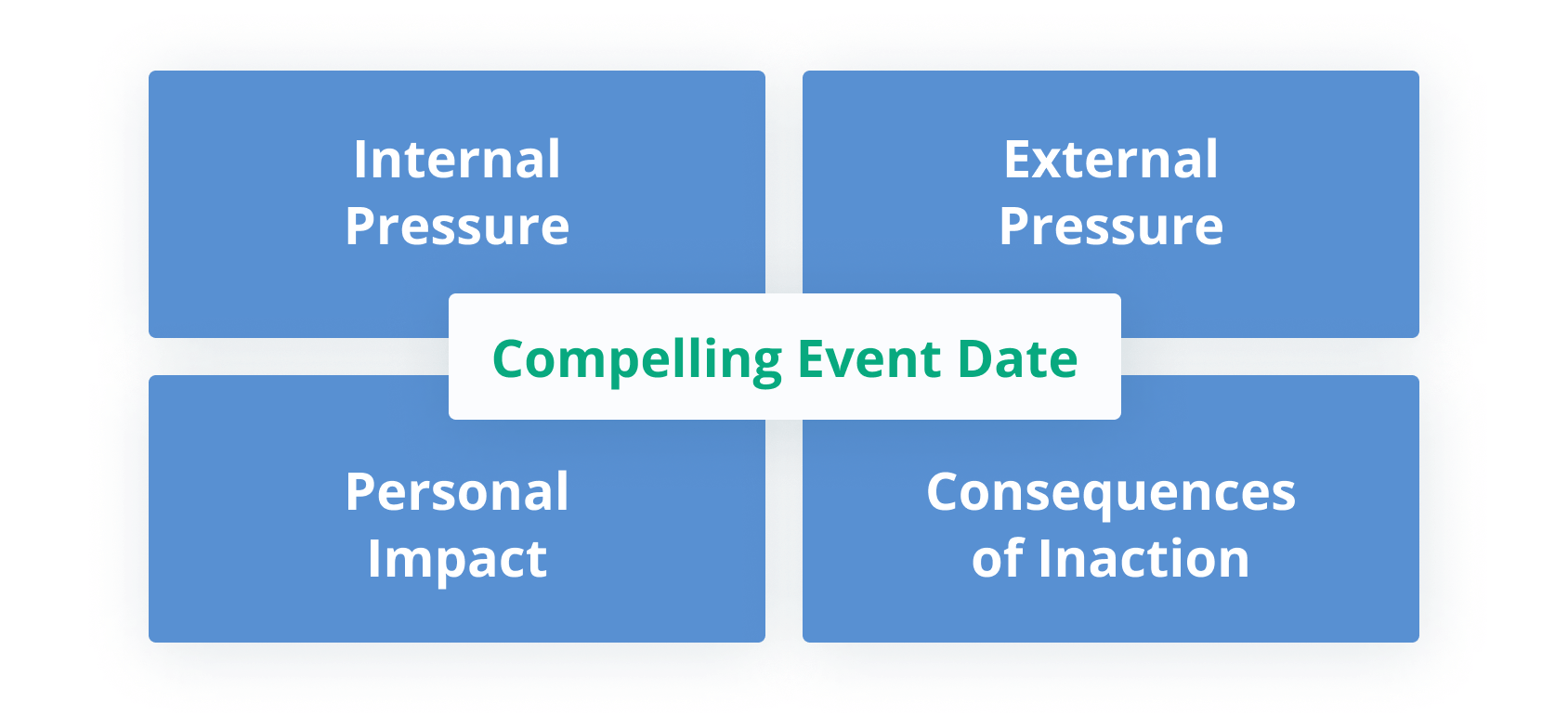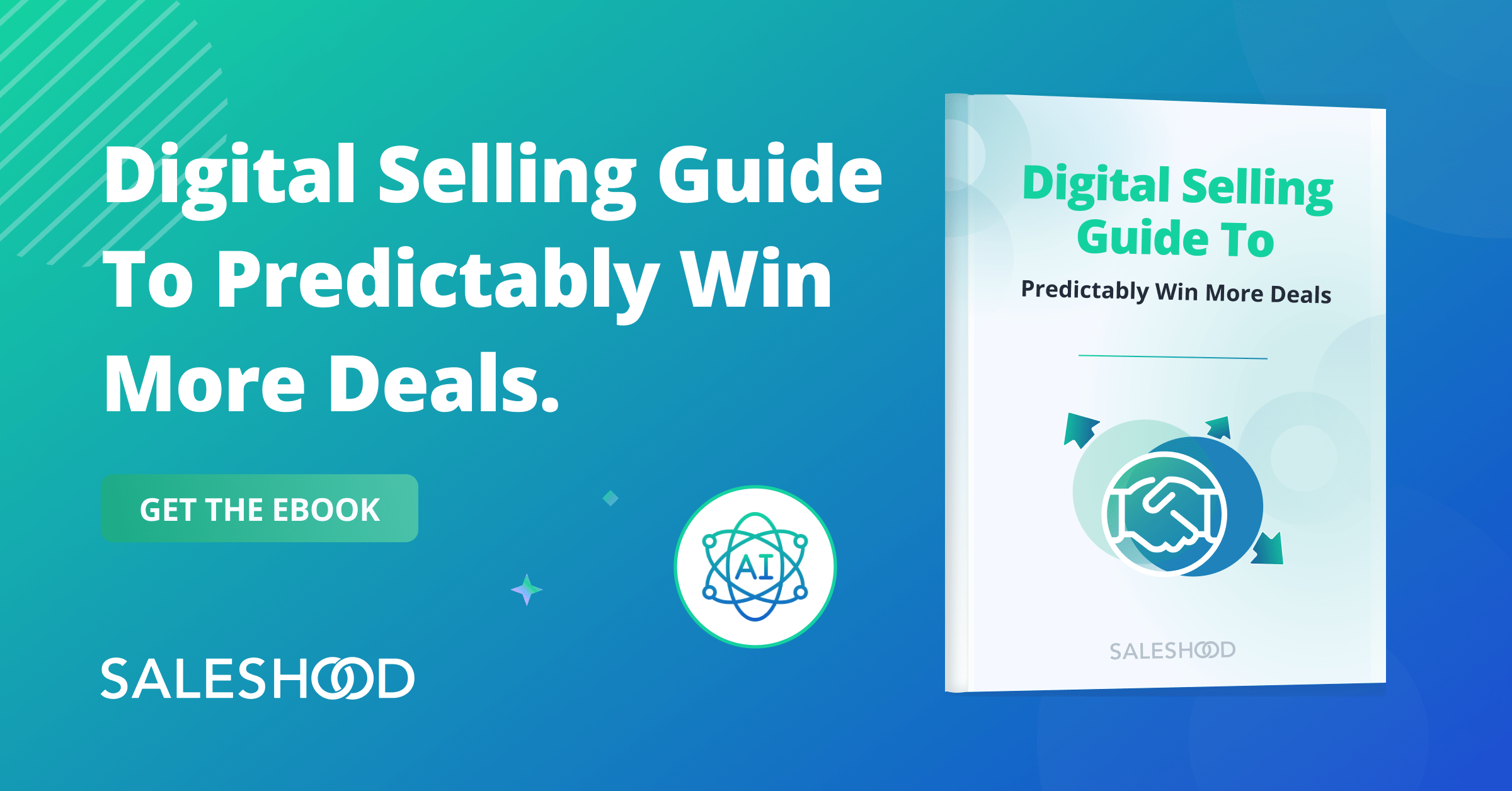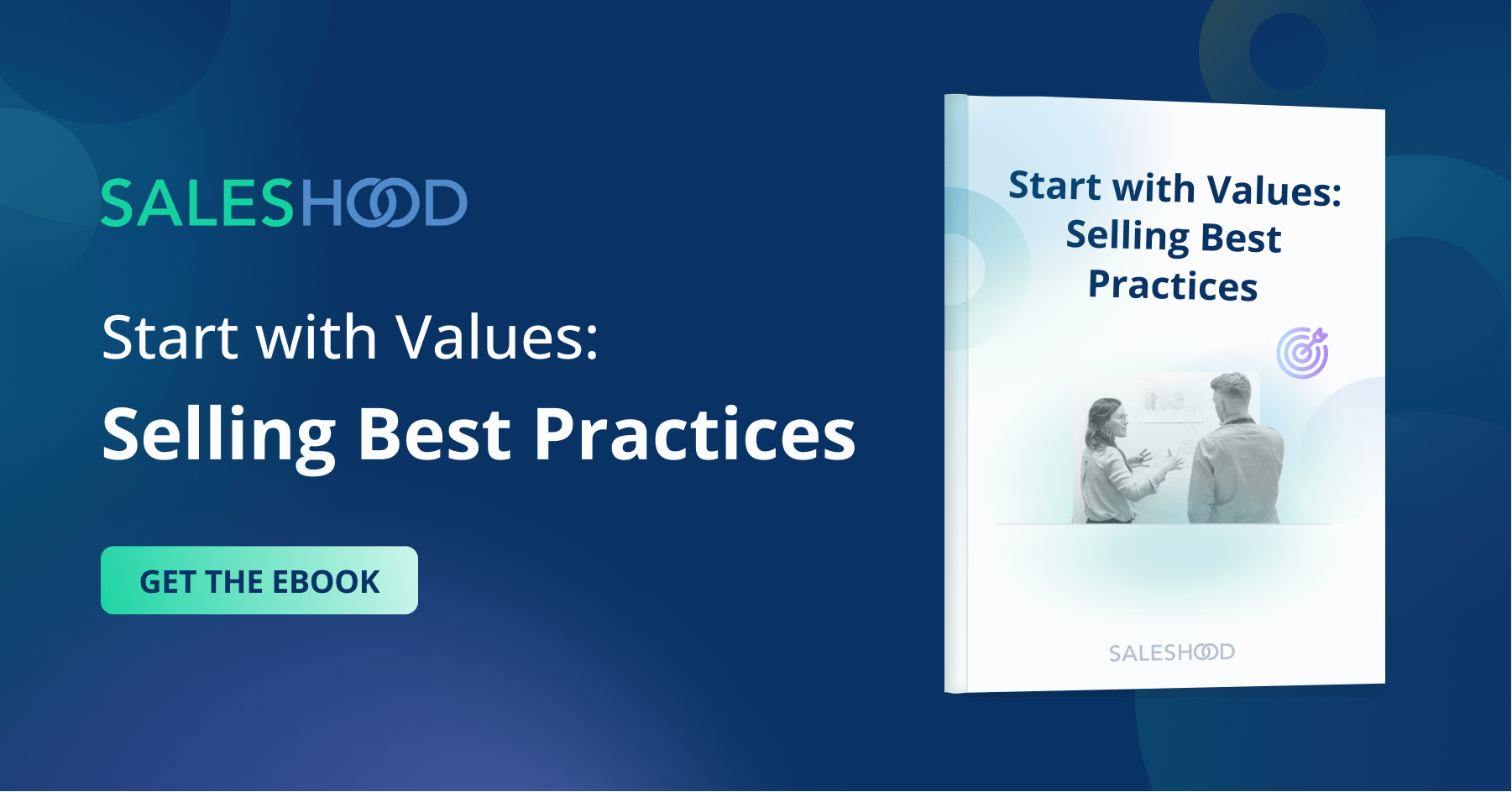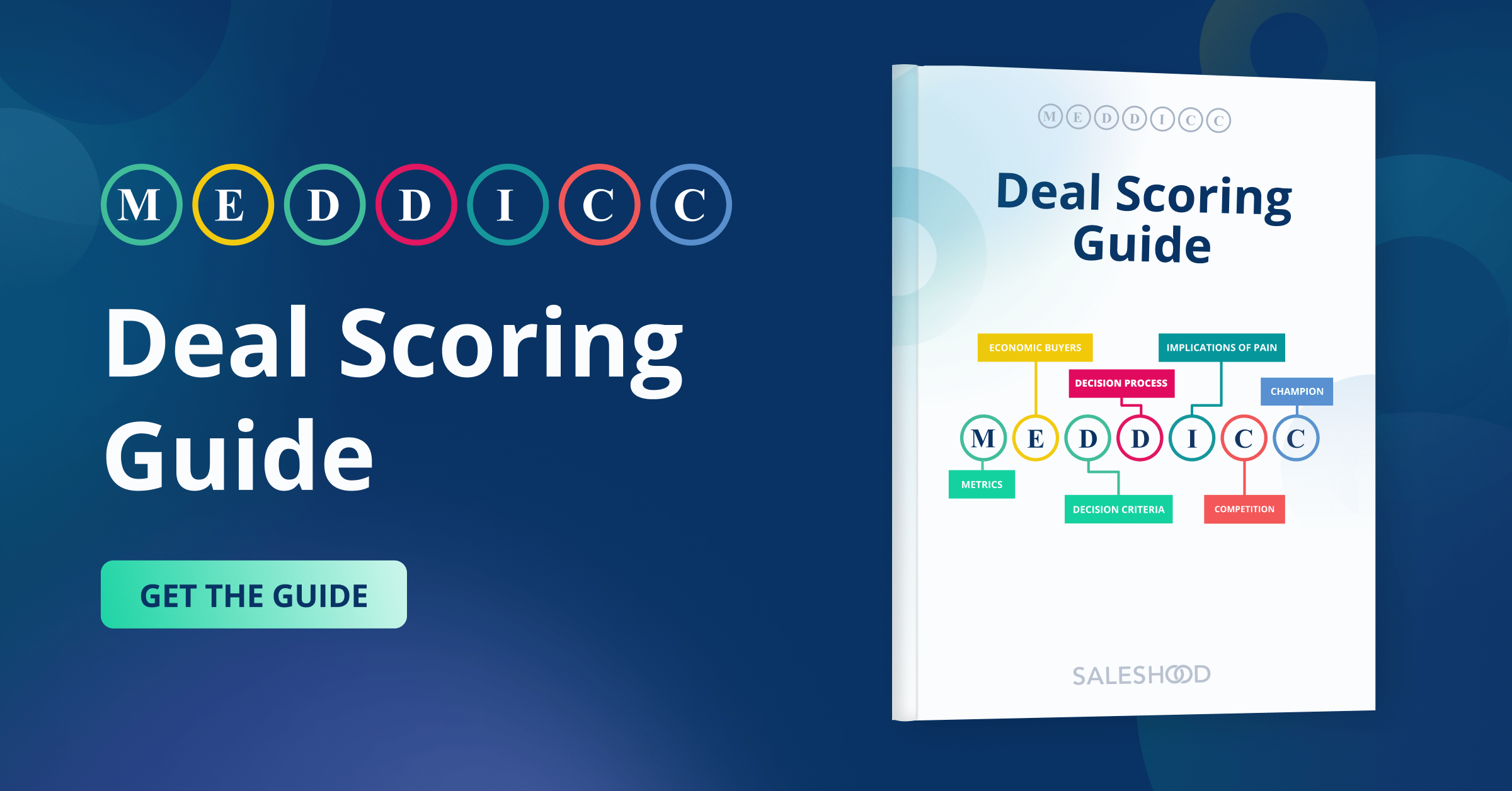A Compelling Event is a proven sales tactic to improve sales process execution and drive better sales results. We all know our revenue teams can close deals without compelling events. However, there’s a good chance our deals will get pushed without co-created compelling events that are buyer centric versus seller centric. We also know that investing time to uncover and co-create compelling events with our champions and economic buyers increases the certainty that deals will close – and close faster.
Compelling Events help our revenue teams prioritize where we’ll spend out our most precious resource – our time. When we talk to sales and customer facing professionals who have real, business issue-oriented compelling events, the following words come to mind:
- Urgency
- Speed
- Confidence
- Certainty
- Commit
Uncovering or co-creating Compelling Events with customers is proven to improve win rates and help close deals close faster. The magic happens when you tap into your customer’s self-declared urgency to solve their top business problems. Once we help a customer uncover (or co-created) their compelling event, they’ll push us to accelerate timelines to solve their business problems. Remember, it’s their compelling event not ours.
Compelling Events are the secret B2B sales process technique and sales tool to qualify deals in or out – faster.
Compelling Events definition
We get asked all the time: How do you define a compelling event?
A compelling event is a time sensitive response to an internal or external business pressure that drives action within a defined time period with consequences of inaction.
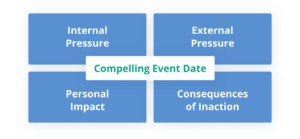 |
All too often we spend too much time focusing on our timelines whether it be end of month, quarter or year versus our buyer’s calendar of priorities. We should be focusing on our customer’s timelines that are mapped to their company calendars and business priorities. For example, we should be looking to align our value with our buyer’s internal and external company events like product launches, users conferences, marketing campaigns and so much more.
Equally important is to share what compelling events are not. Here’s a short list:
-
- Special pricing or terms that expire on a certain date. (Do they ever really expire?
- Your month end
- Your quarter end
- Your year end
- Get deal done before executive visit
Watch this short 2 minute video to learn more about what is and what is not a compelling event.
Compelling Events data insights and observations
Over the years, SalesHood powered hundreds of thousands of deal reviews and sales coaching huddles. We also analyzed a data set of 100,000 opportunities across 10 companiesWe analyzed the win/loss data and sales cycle time of thousands of deals for B2B high technology software companies.
We analyzed a data set of 100,000 opportunities across 10 companies in 2021 and 2022. Here’s what we observed from the data.
- There is a strong positive correlation (.8) of deals that have a customer defined Compelling Event to faster sales cycle time and more deals closed as won versus lost.
- 85% of deals don’t have an identified Compelling Event.
- Many Compelling Event examples are not company focused customer centric.
- Many Compelling Events are pricing focused (which we know aren’t compelling events).
- Compelling Events are described as problems vs, time-based trigger events.
- When a Compelling Event is more than 10 words, it usually isn’t a Compelling Event.
The advice to sales management is to add Compelling Events to your forecasting judgement and cadence.
Sales management, sales process and sales forecasting guidance
We recommend including Compelling Events in your forecasting process.
- Create lists of common Compelling Events types that are mapped to roles, buying personas and your Ideal Customer Profile (ICP) top issues.
- Update your Salesforce/Microsoft CRM system to include Compelling Events as a field.
- Review and reinforce Compelling Events in deals during pipeline reviews and forecasting.
- Enable your teams to work backwards and create a sequence of events starting with a Compelling Event.
Since a compelling event is a customer’s business pain that needs to be solved by a certain date, or else, something bad happens to the executive who owns solving that problem, if one exists (or doesn’t exist), impact the forecast. Uncovering a compelling event creates deal certainty. The impact of the consequence of inaction is the lever we use to accelerate a deal and forecast our deals more accurately. Our job as seller and sales managers is to tie our solutions to real compelling events and close more deals with greater certainty.
Sales process tools and guides
It’s important that we arm our teams with buyer persona compelling events by department. These are useful for sales development (SDR), account executives (AE), account managers (AM) and customer success managers (CSM). Here some examples of compelling events for each:
 |
Marketing: When selling to marketers, we’re going to want to be curious about upcoming campaigns and product launches. Another area to ask questions about is website initiatives.
Customer Service: When selling to customer service and help desk executives and buyers, focus on new call centers, customer commitments and any seasonality of their business. It’s also good try out their product and their customer service channels.
Sales: When selling to sales leaders and revenue executives, find out dates and plans for their upcoming kickoffs and quarterly business reviews (QBRs). It’s also good to learn more about their sales tech stack along with any upcoming hiring classes and cohorts. It’s good to also find out about any partners conference if they are a company with an indirect channel focus.
IT: When selling to IT it’s best to find out about IT backlogs, new systems and other top IT projects. It’s good to get curious about any technology that is intended to be replaced.
With each of these compelling events types the trick is to find the initiatives that are a top priority, then show your executive how you can get them on a path to solving it. Once you do that, your deal will move super fast.
For example, if you sell technology to a VP Marketing and you’ve uncovered that they’re launching a new website on October 15. Your solution will help them make their website better. The way you drive urgency is to set up a sequence of steps that gets your technology trialled, personalized and operational before the October 15th date to ensure your customer will confidently hit their goals. It’s not your compelling event, it’s your customer’s compelling event.
What does your list look like? Spend the time to create your list then train your teams. Have them practice and share best practices. Then, make sure your list and supporting resources are available just-in-time in their Salesforce or Microsoft CRM system or pushed front and center in their workflow.
Questions to ask buyers to uncover or co-create Compelling Events
Here are more sales process guides and sales tools to help your teams uncover and co-create Compelling Events. It’s a great idea to provide your teams with suggested questions to engage your buyer’s in a meaningful conversation about their priorities and Compelling Events. These questions assume a relationship has been developed and are usually communicated after some rapport building.
|
There are many, many more questions. These are just a sample of a conversation flow to help uncover a company’s Compelling Event. Once you identify a top executive’s priority, tied to a specific date, that is mapped to your solution, then you can create a sequence of events to drive urgency around rolling out your solution to meet their timeline. You will win more deals with greater certainty if you follow this sales technique. It’ll be come the best sales tool you have.
Sales coaching checklist
Here’s a sales coaching checklist to use to validate the authenticity and urgency of compelling events in our deals:
-
- What business problems are we solving?
- What’s the financial impact of solving these business problems?
- When do the business problems need to be solved by and why?
- What personal and company-wide consequences happen if the business problems aren’t solved by this date?
- Which top executive have we spoken with who validated the prioritization and quantification of the problems?
- What time-based customer activity are we helping to execute that’s aligned with the problems to be solved? (Once you identify this date, then work backwards to create a sequence of events to meet this date.)
- When did the champion and executive sponsor approve the mutual plan aligned with customer’s timeline and customer’s compelling event?
- What are the risks of the customer not including our solution in their plan to solve the problem?
Clarity of these questions will help us stop having “happy ears” in our deals and we’ll start spending more time on deals that win versus deals that get stuck or are lost.
Another great sales coaching tip is to guide your teams to “start with Who, Then they move to Why, What, and How. And then eventually to When, and How Much. They know that far more important than what you say is getting to the right person to say it.” Read the full article here.
How These Sales Tactics Align with Today’s Macro-Economic Uncertainty
In a world of budget freezes, longer decision cycles, and heightened risk aversion, buyers are more cautious than ever. Sales teams need to execute with precision to keep deals moving. Here’s how three proven Compelling Event tactics apply in today’s economic climate:
💡 Align the Buying Team Around a Shared Deadline → Budgets are tightening. If a deal doesn’t close by a set date, it may get pushed to the next quarter—or lost entirely. Getting buyers to commit to a deadline ensures they secure funding before priorities shift.
💡 Tie Compelling Events to Business Impact → CFOs are scrutinizing every purchase. Buyers must justify ROI and risk. Sales teams that connect purchases to cost savings, efficiency gains, or revenue growth will have an edge over those relying on generic value props.
💡 Proactively Remove Late-Stage Delays → Procurement and legal teams are slowing things down. Sales teams that anticipate approval bottlenecks and use Mutual Action Plans in Digital Sales Rooms can streamline approvals and prevent last-minute stalls.
In uncertain times, urgency alone won’t close deals—execution will. Sales professionals who master these tactics will control the sales process, mitigate risk, and keep revenue flowing despite economic headwinds.
None of these sales tactics is rocket science, however these tactics aren’t being consistently executed.
Compelling Events summary
We learned a lot about how deals are accelerated when sales professionals uncover real customer compelling events.
-
- Compelling events are alway based on internal or external business pressures that are tied to an executive’s top priorities and compensation.
- Compelling events are time-based and result in a consequence if no action is taken.
- If your compelling event is more than fifteen words, then you don’t have a compelling event.
- Compelling events are uncovered through thoughtful discovery and/or created by working with champions to re-prioritize initiatives.
- Compelling events are tied to measurable and quantifiable outcomes.
- Compelling events are not our month/quarter/year end or a special “today only” discount.
- Get to a compelling event faster by answering these questions: What are they buying? Why are they buying? When are they buying? Who is buying? Who is paying?
- Your sales team is the first line of defense against compelling event blinds spots and “happy ears” in deals.
- Compelling events result in better win-rates and faster deal velocity.
- Get beyond the business problem/pain/priority to uncover a compelling event. Be curious and get to the why and by when.
Share this guide with your sales teams. Implement these ideas in your deal reviews, quarterly business reviews and forecast calls to immediately move the needle and grow top-line revenue. Make compelling events part of your sales values and operational cadence.
